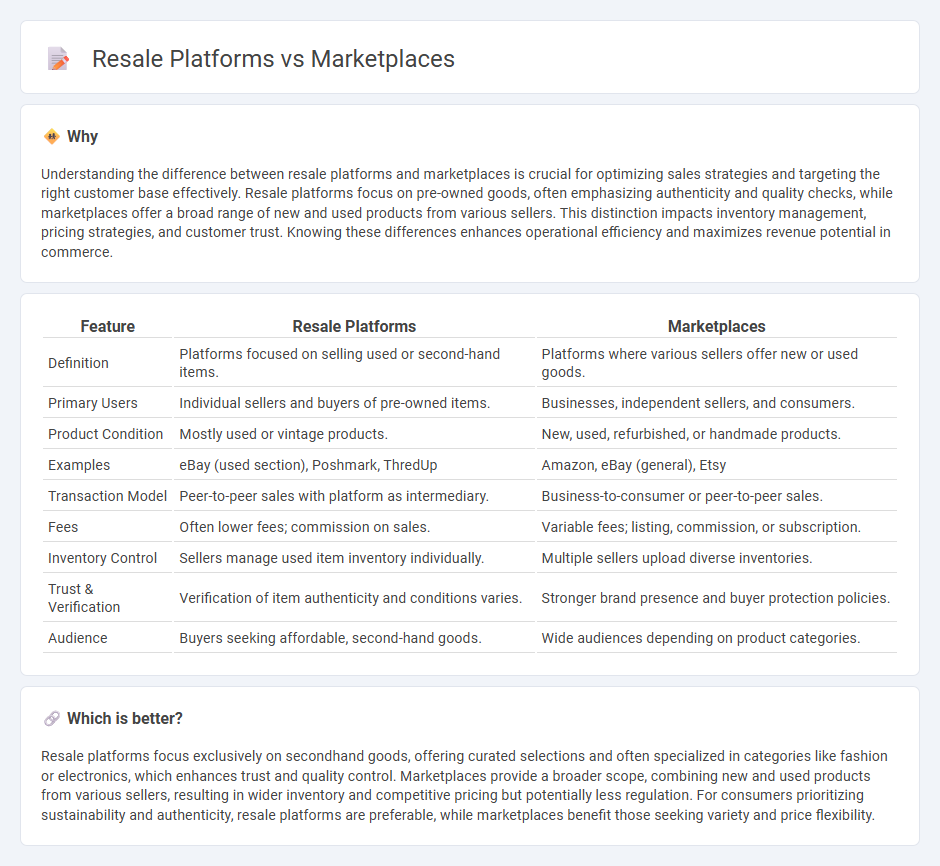
Resale platforms specialize in facilitating the sale of pre-owned goods, offering users the ability to buy and sell items directly within niche communities, often focusing on sustainability and affordability. Marketplaces, on the other hand, provide a broader spectrum of products, including new and used items across various categories, connecting multiple sellers and buyers in a centralized digital space. Explore the distinct advantages of resale platforms versus marketplaces to find the optimal selling or buying experience.
Why it is important
Understanding the difference between resale platforms and marketplaces is crucial for optimizing sales strategies and targeting the right customer base effectively. Resale platforms focus on pre-owned goods, often emphasizing authenticity and quality checks, while marketplaces offer a broad range of new and used products from various sellers. This distinction impacts inventory management, pricing strategies, and customer trust. Knowing these differences enhances operational efficiency and maximizes revenue potential in commerce.
Comparison Table
| Feature | Resale Platforms | Marketplaces |
|---|---|---|
| Definition | Platforms focused on selling used or second-hand items. | Platforms where various sellers offer new or used goods. |
| Primary Users | Individual sellers and buyers of pre-owned items. | Businesses, independent sellers, and consumers. |
| Product Condition | Mostly used or vintage products. | New, used, refurbished, or handmade products. |
| Examples | eBay (used section), Poshmark, ThredUp | Amazon, eBay (general), Etsy |
| Transaction Model | Peer-to-peer sales with platform as intermediary. | Business-to-consumer or peer-to-peer sales. |
| Fees | Often lower fees; commission on sales. | Variable fees; listing, commission, or subscription. |
| Inventory Control | Sellers manage used item inventory individually. | Multiple sellers upload diverse inventories. |
| Trust & Verification | Verification of item authenticity and conditions varies. | Stronger brand presence and buyer protection policies. |
| Audience | Buyers seeking affordable, second-hand goods. | Wide audiences depending on product categories. |
Which is better?
Resale platforms focus exclusively on secondhand goods, offering curated selections and often specialized in categories like fashion or electronics, which enhances trust and quality control. Marketplaces provide a broader scope, combining new and used products from various sellers, resulting in wider inventory and competitive pricing but potentially less regulation. For consumers prioritizing sustainability and authenticity, resale platforms are preferable, while marketplaces benefit those seeking variety and price flexibility.
Connection
Resale platforms and marketplaces are interconnected through their shared goal of facilitating the buying and selling of pre-owned goods, leveraging digital infrastructure to connect sellers with a wide audience of buyers. These platforms utilize advanced algorithms and data analytics to optimize inventory visibility, pricing strategies, and transaction security, enhancing user experience and trust. Integration of payment gateways and logistics services further streamlines commerce, creating a seamless ecosystem that supports the circular economy and boosts consumer access to sustainable shopping options.
Key Terms
Business Model
Marketplaces operate as intermediaries connecting buyers and sellers, often generating revenue through listing fees, commissions, or subscription models, facilitating new product transactions across diverse categories. Resale platforms specialize in peer-to-peer transactions for pre-owned goods, leveraging authentication services and condition grading to build trust and justify pricing, typically earning through commission on sales or listing promotions. Explore in-depth comparisons to understand which business model aligns best with your entrepreneurial goals.
Inventory Ownership
Marketplaces like Amazon or eBay typically do not own the inventory they list, acting instead as intermediaries connecting buyers and sellers. Resale platforms such as Poshmark or ThredUp often have greater control over inventory, sometimes purchasing items outright or managing consignment stocks. Explore the distinctions in inventory ownership models to optimize your e-commerce strategy.
Transaction Fees
Marketplaces like Amazon and eBay typically charge sellers a percentage of the transaction value as a fee, often ranging from 5% to 15%, impacting overall profit margins. Resale platforms such as Poshmark and Depop may have lower or flat fees but often include additional service charges for payment processing and shipping facilitation. Explore detailed fee structures and seller experiences to optimize your selling strategy across these platforms.
Source and External Links
Marketplace - A marketplace is a location or concept where buyers and sellers meet to exchange goods and services; types include wholesale, retail, fairs, and specialized markets like India's landa bazaar or haat.
Top 10 online marketplaces: leading ecommerce platforms - Online marketplaces are virtual platforms for buying and selling products, ranging from global giants like Amazon and eBay to niche marketplaces like Etsy, with types including vertical, horizontal, and global marketplaces.
The best online marketplaces for ecommerce sellers (2025) - For ecommerce sellers, leading marketplaces include Amazon, eBay, Walmart, and specialized platforms such as Target Plus and Macy's Marketplace, each offering different audiences and seller benefits.
 dowidth.com
dowidth.com